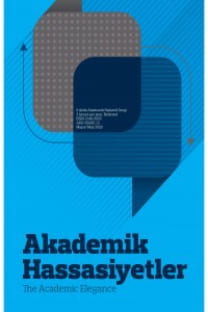COVID-19 SALGINI, DÜNYA DÜZENİ VE TÜRKİYE
Bu makale, Covid-19 salgınının dünya düzeninde meydana getirebileceği değişikleri ve bunların Türkiye üzerindeki muhtemel etkilerini konu edinmektedir. Güç geçişi teorisinin tasvir ettiğine benzer biçimde, rakip büyük aktörler arasındaki rekabetin yükseldiği bir dönemde başlayan salgın, uluslararası sistemdeki gerilimleri yükseltmektedir. Hastalıkla etkin mücadele edebilen devletler vatandaşları nezdindeki itibarlarını arttırırken, diğerleri meşruiyet krizleri yaşayabileceklerdir. Virüsün ekonomiler üzerindeki etkisinin, kısa vadeli tahribatla sınırlı kalmayacağı, belirli sektörleri ve ekonomik yaklaşımları daha avantajlı hale getireceği varsayılmaktadır. Yeni konjonktürde, hayat-ölüm ilişkisinin manalandırılması ve mahremiyet-güvenlik dengelerinin düzenlenmesi meselesi anlam sistemleri arasındaki rekabette öne çıkmaktadır. Türkiye, salgının süresi ve meydana getireceği tahribata bağlı olarak, halihazırda çatışmalarla yüz yüze olduğu bazı bölgelerde hayat kurtaran gücüne dayalı stratejiler tasarlayabilir. Orta ve uzun vadede ise dünya düzeninin en küçük temel birimlerinden başlayan değişim potansiyelini fark etmesi, orjinal gelecek tasarımları için motivasyon üretebilir. Endüstri 4.0’ın vadettiği teknolojik imkanlar, virüs salgını sebebiyle gündeme gelen biyolojik tehlikeler, güvenlik-ekonomi-anlam sistemleri üçgeninde yeni gelecek senaryolarına davetiye çıkarmaktadır. Makaledeki “Türk Evi”yle ilgili tahayyül, bu potansiyele işaret eden bir başlık açmaktadır.
Anahtar Kelimeler:
Covid-19 Salgını ve Dünya Düzeni, Corona Virüsü ve Türkiye, Dijital Dönüşüm, Biyolojik Savaş, Türk Evi
COVID-19 PANDEMIC, WORLD ORDER AND TURKEY
This paper investigates the changes the Covidien-19 outbreak can create in the world order and their possible impacts on Turkey. The pandemic began in a period when competition among major rival actors of the international system was on the rise in accordance with what the power transition theory depicts. Now, the virus even deteriorates the already strained relations among them, especially between U.S. and China. Governments that can effectively fight the disease increase their reputation among their citizens, while others will experience legitimacy crises. It is expected that the impact of the virus on national economies will not be limited to short-term destruction and will make certain sectors and economic approaches more advantageous. With this new conjuncture, the issues stand out: the meaning of the relationship between life and death and the regulation of privacy-security balances. Turkey can design strategies based on its life-saving power in some conflict zones which it is already part of, depending on the duration and the damage of the epidemic. In the medium and long term, realizing the potentials for change beginning from the smallest basic units of the world order may generate motivation for the original future designs. Technological possibilities promised by Industry 4.0 and biological hazards brought up due to virus outbreak invite new future scenarios in the triangle of security-economy-meaning systems. The projection as to this potential is mentioned in the section the "Turkish House".
___
- Ağaoğlu, Ç. (2018). Kıbrıs-Afrin Hattı, 1878-2018. Hiperlink Yayınları
- Andersen-Rodgers, D., Crawford, Kerry F. (2018). Human Security: Theory and Action, Rowman & Littlefield.
- Bertram, C. (2008). Imagining the Turkish House: Collective Visions of Home, University of Texas Press.
- Beyatlı, Y. K. (1980). Türk Evi, Yahya Kemal’in Dünyası, (Ed. S. Ünver), Tercüman Yayınları
- Chambers, D. (2020). Cultural Ideals of Home: The Social Dynamics of Domestic Space, Routledge.
- Çetin, M. (2014). 'Yeni Sınıf'ın Kentsel Katliamı! Türk Yurdu, 103(319).
- Drezner, D. (2011). Theories of International Politics and Zombies, Princeton University Press.
- Flanders, J. (2014). The Making of Home: The 500-year Story of How Our Houses Became Homes, Atlantic Books.
- Flechtheim, O.K. (1966). History and Futurology. Meisenheim am Glan: Anton Hain Verlag.
- Gildart, C. (1929). The Roman Military Road System. The Military Engineer, 21(117), 256- 258. www.jstor.org/stable/44573117
- Gilpin, R. (1981). War and Change in World Politics, Cambridge University Press.
- Hagamen, L. (2017). Economy, Community, and Place. Communities, (175), 31-33. https://search.proquest.com/docview/1907289275?accountid=17384
- Harris, K. L., Borders, A.L. ve Harris, K.N. (2019). The Proliferating Singles' Population and Its Impact on a Transformative Marketing Landscape, Journal of Managerial Issues, 31(3).
- Haşim, A. (1988). Üç Eser: Bize Göre; Gurebâhâne-i Laklakan; Frankfurt Seyahatnamesi, MEB. ss.102-104.
- Helmer-Hirschberg, O. (1967) Analysis of the Future: The Delphi Method. RAND Corporation. https://www.rand.org/pubs/papers/P3558.html
- Howard, A. (2020). The Pandemic And America‟s Response To Future Bioweapons, War On the Rocks, May 1, 2020, https://warontherocks.com/2020/05/the-pandemic-and-americasresponse- to-future-bioweapons/
- Jantsch, E. (1967). Technological Forecasting In Perspective. Organisation for Economic Co-operation and Development.
- Kent, S. (1966). Strategic Intelligence for American World Policy. Princeton University Press.
- Löfflmann, G. (2013). Hollywood, the Pentagon, and the Cinematic Production of National Security, Critical Studies on Security, 1:3, 280-294.
- Okur, M. A. (2015). Emperyalizm, Hegemonya, İmparatorluk: Tarihsel Dünya Düzenleri ve Irak’ın İşgali, Ötüken Yayınevi.
- Okur, M. A. (2016a, 18 Kasım). Amerikan Milliyetçiliği ve Glonasyonalizme Geçiş. Yeni Şafak. https://www.yenisafak.com/hayat/amerikanmilliyetciligi- veglonasyonalizme-gecis-2566077
- Okur, M. A. (2016b). Karmaşa Çağında Organski‟yi Hatırlamak: Doğu Avrupa‟daki Gerilimlerin Küresel Bağlamı. M. Şahingöz ve A. Alp(ed.) içinde, Hamdullah Suphi ve Gagauzlar (ss.139-148). Türk Yurdu Yayınları.
- Okur, M. A. (2018). Güvenlik Çalışmaları, Büyük Kararlar Ve „Dünyalar İçindeki Dünyamız‟: Tarihsel Kırılma Sürecinin Düşündürdükleri. M.A. Okur(ed.) içinde, Güvenlik: Kargaşa ve Belirsizlik Çağından Nereye (ss.11-49). Kocav Yayınları.
- Organski, A. F. K. (1968). World Politics. Second Edition. New York, NY: Alfred A. Knopf
- Rindzevičiūtė, E. (2016). A Struggle for the Soviet Future: The Birth of Scientific Forecasting in the Soviet Union. Slavic Review, 75(1), 52-76. doi:10.5612/slavicreview.75.1.52ız.
- Rosner, V. (2020). Machines for Living: Modernism and Domestic Life, Oxford University Press.
- Šehović, A. B. (2018). Reimagining State and Human Security Beyond Borders, Palgrave Macmillan.
- Sethi A. (2019) Key Segments of Chinese Consumers. In: Chinese Consumers. (A. Sethi) Palgrave Macmillan.
- Stiglitz, J. (2019). People, Power, and Profits: Progressive Capitalism for an Age of Discontent, W. W. Norton & Company.
- ISSN: 2148-5933
- Yayın Aralığı: Yılda 3 Sayı
- Başlangıç: 2014
- Yayıncı: A Kitap
Sayıdaki Diğer Makaleler
COVID-19 SALGINI, DÜNYA DÜZENİ VE TÜRKİYE
YÖNETİM TARTIŞMALARINDA KAMU YARARINDAN KAMU TERCİHİNE VE KAMU DEĞERİNE
DEDE KORKUT KİTABI’NDAKİ HİKAYELERİN BENLİK SAYGISINA ETKİSİ ÜZERİNE BİR ÇALIŞMA
ORTADOĞU’DA MÜDAHALECİLİK VE EGEMENLİK
IRKÇILIĞIN DÖNÜŞÜMÜ: KAVRAMSAL VE KURAMSAL BİR ANALİZ
Emine ERDEN KAYA, Şenol DURGUN
MADDE BAĞIMLISI BİREYLERİN SOSYODEMOGRAFİK BİR ANALİZİ: İSTANBUL ESENYURT ÖRNEĞİ
DOĞU AKDENİZ’DE MÜNHASIR EKONOMİK BÖLGE TARTIŞMALARI VE TÜRKİYE’NİN VİZYONU
Fatih Fuat TUNCER, Zeynep Deniz ALTINSOY
Özlem SANRI, Ayşe İLGÜN KAMANLI
